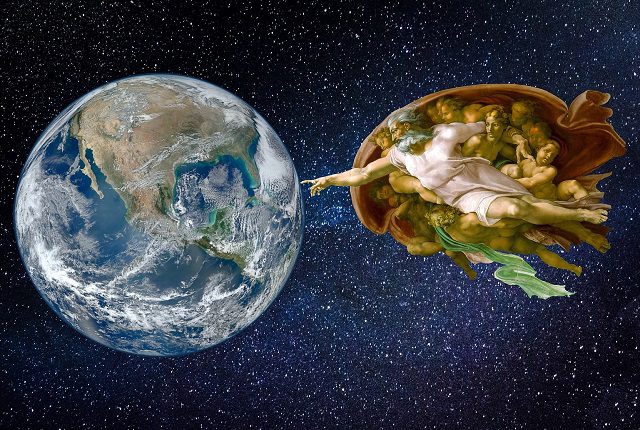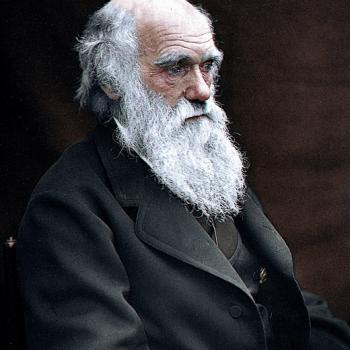
Dr. Lydia McGrew is a philosopher, Anglican, and author of what looks to be a very delightful book: Hidden in Plain View: Undesigned Coincidences in the Gospels and Acts (2017). I always enjoy talking with her, and this was no exception. It occurred spontaneously and very rapidly (we both write fast!) on my Facebook page yesterday. It’s a follow-up discussion to my two recent posts:
*
*
Lydia’s words will be in blue.
*****
I’m all in favor of intervention and miracles. Not a thing wrong with them. Not even in biological areas.
*
I’m not denying any miracles (they take place at every Mass, and I believe in healing miracles, etc.); only denying the necessity of them with regard to a philosophy of Intelligent Design (just to make that clear). There is no animus against them on my part.
*
I tend to think it’s a little more complicated than that. I love Mike Behe and his work, but I think it does support intervention. As an epistemologist, I find that the statement that some conclusion isn’t necessary doesn’t move me much. Pretty much any conclusion in an empirical realm is not strictly necessitated by the evidence for it. I think it’s extremely difficult to give any clear meaning to detectable design without intervention and that it is strained to attempt to do so.
*
Well, it is his position that this is one acceptable version of ID (one I’m inclined to agree with). I cited his 2008 book,
The Edge of Evolution:
[T]he designer took all necessary steps to ensure life. Those who worry about “interference” should relax. The purposeful design of life to any degree is easily compatible with the idea that, after its initiation, the universe unfolded exclusively by the intended playing out of natural laws.
Could you give me a nutshell explanation of how you think such post-creation “intervention” from God would work?
*
Same way any intervention from God works! It might take the form of God’s creating a new animal species. It might take the form of God’s creating a new gene or miraculously modifying an existing one. Whatever it took to bring about the irreducibly complex system or entity that would not come about otherwise without his involvement. Indeed, there is far more of a question of what it even means or how it would even work for God deliberately to design something without intervening. Prima facie, if the blood clotting cascade shows up full-formed at x point in time and not before, and if it is irreducibly complex and requires all of these parts to be in place at once in order to work, that is like a 747 showing up on my lawn. I assume that whatever happened happened then, not by being “front-loaded” in some inconceivable fashion billions of years ago in the singularity.
*
We don’t assume that God front-loaded the water turning into wine at the wedding at Cana but rather that, at that time, God made the water turn into wine.
*
I know that what you’ve quoted is Mike’s position. I disagree with him on that point. (I’m pretty sure I told him that approx. 20 years ago, so it won’t come as a shock to him! :-)) “Easily compatible” is far too strong, and indeed the scenario there is quite difficult even to cash out. Again, this is not to knock Mike’s work. I am a huge fan of Mike’s work. I just think intervention should be embraced rather than being shunned or avoided, because it is by far the simplest explanation of what we see.
*
You may be right. Me, I think doing it all from the start, but including some unknown “non-scientific” / non-empirical / non-miraculous supervision is more plausible. And one reason I would give for that is the very rarity of miracles.
I think this whole thing far transcends science and empirical matter alone. There is a non-material “spirit” involved. The Holy Spirit, if you will . . .
Well, new types of IC [irreducibly complex] systems apparently aren’t coming into existence now. This all would have happened millions of years ago, probably all or almost all before mankind himself was created.
*
I think there is a sense of ongoing involvement in terms of God “upholding” the universe (Heb 1:3); also the fact that He is outside of time. So we could say that He did it all in the beginning of creation, but for Him there is no sequential time, so . . . it’s only a distinction that makes sense to us in our temporal limitations. Just thinking out loud . . .
My position before yesterday was basically yours. The new thing for me was discovering that there was such a thing as “non-interventionist ID”: which seems more plausible to me.
But you could say that he “did” the parting of the Red Sea and the raising of Lazarus outside of time as well. Yet obviously we also say that he intervened. I think that what he did to bring about biological systems and entities should be regarded as in that category, however we cash out that category metaphysically.
*
Do you agree that it is possible that there is some sort of non-material force that influences the course of material evolution, and that it could conceivably have been put in place in the beginning: but can’t — by definition — be examined by science?
*
To be quite honest, I’m not even sure what that means. If I really strain and squint and sort of pretend to myself that I know what it means, then I might say, “Sure, it’s logically possible. In the same way that it’s logically possible that the Masons control all the banks but can’t, by definition, be caught doing it. But lots of things that are logically possible are empirically meaningless and completely unjustified.” The immaterial force for which we have evidence is not just a force but a person. He is the person who is God. And we have a clear idea that he acts in history. And we call his acts in history “miracles.” I see no reason to introduce vague and possibly meaningless “immaterial forces” in addition to God that are impossible to see but somehow exist in addition to both the physical evidence and God.
*
“Non-interventionist ID” doesn’t seem even remotely plausible to me, and that is partly because I think it’s more or less just a slogan. It has no clear scientific meaning, and it’s completely unnecessary. Moreover, the evidence is all against it. If the blood-clotting cascade showed up quite suddenly at a particular time, then why not think of it as brought about by intervention? That is by far the prima facie case. The only argument against it is, I’m sorry to say, distaste for intervention in biological areas. Which quite honestly I view as an unjustifiable prejudice. I’d say, go back to your position before yesterday. :-) :-) Please understand that I’m not saying this in anger.
*
Well, I held your view a lot longer than my present one (about 24 hours now). :-) If I had any prejudice on the matter, it surely would have shown up before now . . .
*
I didn’t mean you. I meant all the people pressuring ID-ers because, “Yuck! Intervention! Ewwww.”
*
One analogy would be to development of doctrine, which unfolds on its own. I think it’s a weak analogy, but still an analogy.
*
Of course this “force” is from God. That’s my view. If we admit that empiricism is not the only form of knowledge or analysis, I see no problem with it.
*
It is multiplying entities utterly without necessity. We have no evidence for such a “force” that is not, ipso facto, evidence for the direct action of God.
*
So now we have a debate between interventionist and non-interventionist forms of ID. I didn’t even know that this distinction existed till yesterday. :-) So I’m having fun. I love to be challenged to think in new ways.
*
And one must ask: If one postulates such a “force” here, why not postulate a “force” that brought about all of the biblical miracles? For the exact same reason: It is a complete fifth wheel as an hypothesis.
*
Please don’t take this to be any sort of hostility towards ID. It’s very much the contrary. I’d like to see them all embrace their interventionism. Paul Nelson I think is an ID scientist who takes my position.
*
God’s providence is often an example of this, I would say. And so we have many biblical examples of someone doing something (pharaohs hardening their hearts, Joseph’s brothers, Satan [with regard to Job], Paul), and then the Bible states that God did it. And I argue that it does because it approaches it in both/and somewhat paradoxical terms.
So human agents did things that were intended in God’s providence, but it was not His direct interference. It simply unfolded. It also didn’t overcome human (or even Satanic) free will.
Er, yes, but there is no human or other agent (as far as we know) who was involved in bringing about the visual cascade, the blood-clotting cascade, or the bacterial flagellum. Once again, why should we make such an analogy rather than just saying that God did intervene? I know of no good reason at all. Now, when it comes to the creation of mosquitoes, I might be more open to demonic intervention instead. :-) Under divine providence, of course.
*
It’s irrelevant whether there is human involvement in blood-clotting. I brought up my arguments about providence in response to your statement: “We have no evidence for such a “force” that is not, ipso facto, evidence for the direct action of God.”
And so I provided counter-evidence: God’s use of people to enact His will, which is — precisely — not direct action on His part, but indirect, through “secondary agents.”
But I meant specifically a force. The secondary agency of real, personal agents isn’t a vague force. It’s the action of secondary personal agents, using free will. Of course we have evidence for that. We see it directly in ourselves. But we don’t have evidence for some kind of impersonal, invisible force that is somehow part of nature but not part of nature, etc., etc. That’s trying to have it both ways.
*
Providence is a sort of force. It’s some mysterious method whereby God accomplishes His will while not overcoming human free will. It’s one of the biggest mysteries in theology, and so it is similar in that way also, to such a notion applied to matter and physical laws.
We simply don’t know how it works. But I have no a priori objection to mystery and lack of human explanations for everything.
If there are causes other than empirical, physical ones (and providence clearly is one such, as is initial creation, since God is a Spirit), then simply crying “science, science” does not overcome or explain away their existence.
This is not just about matter or science, but also about spirit and God.
*
I don’t think I agree about Providence. I think that’s fuzzy thinking. I could go on about that at more length, but I think it would be more to the point to point out that there are reasons why we attribute the weather to general providence but the raising of Lazarus to special divine action. As far as I’m concerned, all of the actual evidence in the case of ID favors putting the necessary actions of God to bring about these entities into the latter rather than the former category. Indeed, a big part of the ID argument is that these events cannot be well explained in terms of the physical laws that we know about. Whereas if we say that the rain came by Providence rather than miracle, part of the point there is that the rain can be well-explained by known physical laws and conditions.
*
How do you disagree about Providence? You agree that God is outside of time, right?
*
Yes, just as he was in relation to the raising of Lazarus. Yet I call that a miracle, not a general providence.
*
Of course it was a miracle.
*
Right. And why do we not go on and on about providence as a force there instead of just calling it a miracle? Well, among other things, because it happened suddenly at a particular point in time and, most importantly, because it does not appear to be attributable to secondary causes. There are no known secondary causes that account for it. It seems then to have been a case of God’s working directly. We don’t make up an indetectible secondary cause, call it a “force,” and insert it into the story, because that would be evidentially unjustified. I think it’s the same way with design in biology.
*
How is God directly intervening when Pharaoh hardened His own heart? How is He directly intervening when Satan tormented Job, with God’s permission? That’s indirect. He allowed both, because they furthered His ends and will. But it was not direct. Nor was either thing “miraculous.”
*
Yes, I’m inclined to agree. But we have evidence there for the existence of the intermediate causes–Pharoah and Satan. We have no such evidence in these cases.
*
“In biology” is strictly not true if there are non-material causes in play that direct the course of evolutionary biology. It’s outside of biology, but is influencing or guiding it.
*
But that’s just being made up out of one’s hat. Just as it would be if one did the same in the case of the marriage at Cana. It’s blatantly ad hoc.
*
Actually, I would say that everything I have said is simply speculation upon what all Christians and theists (even desists) believe: “God created.” It’s merely a matter of determining how He did that, for how long, and whether it involves natural laws only or these laws guided by non-material influences (i.e., design from a Designer).
Nothing is merely coming from “ones hat” in matters of such deep and profound ultimate mystery.I’m glad to wear the same hat as Einstein, and to admit that we can’t explain and understand everything. But we Christians believe in faith that God:
1) Created
2) Upholds His creation in some fashion
3) Guides the course of evolution (insofar as it exists) in some fashion: either
*
a) by natural laws that He created [theistic evolution], orb) a combination of such laws and non-material influences set in place from the outset [my present view: non-interventionist ID]
c) a combination of such laws and periodic miraculous intervention [interventionist ID].
Are you saying that we can or will eventually understand every jot and tittle of how all that works, whatever view we take?
*
I see no reason why we would understand every jot and tittle, if for no other reason than that it happened a very long time ago and we are reconstructing at this point.
What I mean by “from one’s hat” is that the conjecture of a “force” in this case is evidentially extra, just as it would be if we did the same for some biblical miracle.
Why couldn’t it be one explanation for God “upholding” His creation? Are you saying that Christians cannot possibly differ as to how He does that?
We don’t know if that means physically or spiritually. I would argue by analogy that it is more likely spiritual, since initial creation was: matter came from spirit; therefore, that was not strictly a “scientific” or empirical occurrence, and cannot be examined as such.
I haven’t said anything about what “Christians can possibly differ” on. I’m talking about what I think the evidence really does support.
In the area of ID, I think that the very evidence of ID itself shows that the events that have had to happen here involve something other than merely the much vaguer notion of God’s “upholding” the universe. After all, that (“God’s upholding”) is part of the metaphysical background for the formation of ice crystals and the falling of rain and all those law-like events that ID theorists so eloquently show us are not good analogues for the origin of DNA and all these other systems.
Well, we agree (as far as I know) that the laws of science as we know them cannot explain the origins of significantly new biological structures, so God has to “intervene” in some fashion other than through these processes governed by the laws: best as we can make them out to be.
I say that He has the ability to do that from the beginning (that this is included in His omnipotence, omniscience, and providence), and that it involves more than merely physical processes and matter. You say He does so continuously through time via miraculous interventions.
I have given analogies (developed spontaneously in this dialogue and not, I don’t think, even thought about before) as to why I believe my view is more plausible and defensible. But I don’t see how any decisive “victory” can be had in this particular debate. I don’t see any absolute proof on either side. That’s why I am arguing from analogy (which I usually end up doing, given my great love of Cardinal Newman).
I think I’m doing pretty good defending my position against a philosopher and terrific debater, having only held it for one day. :-)
So far as I can see, the only actual reason you’ve brought up for thinking that ID events (can we call them that?) are not interventions is that miracles are (should be?) rare. Note that your analogies aren’t reasons. They aren’t reasons for thinking that God has brought these events about in a non-interventionist fashion. But in relation to the entire warp and woof of natural law and the millions of years in question, the interventions required in these cases would still be quite rare. Indeed, they would be even rarer if we don’t boggle at the special creation of species, since in that case a whole lot of new information would be introduced in a single stroke.
*
Actually, I think my case is a positive one from God’s nature, as I just explained: “He has the ability to do that from the beginning (that this is included in His omnipotence, omniscience, and providence), and that it involves more than merely physical processes and matter.”
Do you agree that it is at least possible or conceivable (if not plausible or actual) that God could do it in the fashion I described?
God has the ability to do all kinds of things, but we conclude that God does do certain things as miracles/interventions rather than by putting in place some extra “force” from the beginning of the universe. Why do we conclude that? For example, in the case of a healing in the cause of a saint’s canonization, why does one conclude that God performed an intervention miracle rather than a non-intervention by way of a mysterious force-in-place-as-part-of-the-universe? Well, we look at when the event took place, what occasioned it, and whether the postulation of such a force would be an ad hoc attempt to avoid postulating an intervention. When the Church puts all that together, it decides that the simplest explanation is that this was a true intervention healing. I would argue that by the same criteria, the best and simplest explanation in the case of design about what God did do (not just what he could do) is that he did directly bring about these events.
*
I would call myself an old-earth progressive creationist. In that sense, I’m not convinced that macro-evolution ever happens at all. So I would not myself even speak of miracles as normative “in” evolution or of evolution as a series of natural processes that are unable to “move to the next step,” because the only kind of evolution that I think we have evidence for (microevolution) doesn’t have steps or stages or teleology of any kind but merely variation. What appears to have happened in fact is that at various points in history God has made new life-forms, new types of creatures, because he wanted to, found them beautiful or interesting, etc. They would never have evolved, nor even close, nor even come within a step, or anything of that kind, because that just isn’t the kind of thing that microevolutionary changes do, any more than they do so now. I hold this position because I think it’s what the evidence favors.
*
That was exactly my position for many years.
*
By the way, I would point out that as a Catholic, you believe in a great many more modern miracles and on-going miracles than I do, because saints right up to our own times are always being canonized on the basis of the conclusion that God has performed miracles at their intercession. I am not saying this in any way to make an anti-Catholic statement but rather to point out that it really would be rather arbitrary to hold that origins of species millions of years ago were not carried out by direct divine intervention because that would mean that God performed miracles “too often” while simultaneously holding that all the saints ever canonized by the Catholic Church, up to those canonized recently, have brought about direct miracles by God’s intervention in response to their prayers.
*
The question at hand with regard to miracles is strictly concerning whether God often, or routinely performs them in order to bring about new species or new biological structures.
I don’t believe so, because I think His omnipotence is such that He could create all that with the potentiality to bring about everything that we see now. It just seems more plausible to me. I’ve given some reasons why it does. They may not be very strong. I don’t know. Plausibility is a whole discussion in itself.
But no one is praying that a slug evolves into something else. This is the difference. The miracles we both believe in (and more that I would and you probably wouldn’t, as you say) have to do with answered prayers and some sort of witness to human beings. So I think they are much more frequent (and helpful in their purpose to transform and convert people), but still not all that frequent.
God actually probably isn’t creating any new species nowadays. So it would be the past tense (from our human perspective). That God did perform miracles to bring new species into existence.
As far as a witness to human beings, I would say that the evidence of design in biology is a huge witness to human beings. I argue, then, that trying to make “design” into something non-interventionist is ad hoc as it would be if we believed that a 747 appeared somewhere quite suddenly.
Thanks for a great debate. Again, as I said, I have no objection to miracles whatever. We simply differ on how often God performs them and whether they are virtually normative in evolution, wherever natural processes cannot move to the next step, due to incomprehensible complexity and virtual impossibility.
I want to stimulate the minds of our readers, and I think we have both done that. That’s far more important to me than whether I have “prevailed” or not. So I am grateful for the opportunity to have such a stimulating dialogue.
***
***













